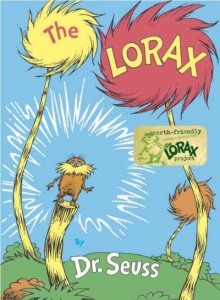 Recently, my Environment and Society class watched The Lorax. I know what you’re thinking, why is a college class watching Dr. Seuss videos?
For those who don’t remember the story from childhood the Lorax is a small fuzzy creature who lives in the truffula tree forest and speaks “for the trees.” He’s an environmentalist who stands up to the Onceler, an industrial tycoon who’s chopping down all the truffula trees to make thneeds, “which everyone needs.”
The story goes on to show the results of unchecked, greed-driven production. The skies turn black. The rivers fill with waste. The animals run out of food and are forced to leave their home. Finally, the very last truffula tree is cut down. Then there’s nothing left but polluted, lifeless wasteland.
It’s a very powerful story. So much so, in fact, that it’s been banned from schools in some logging communities. Dr. Seuss argued that the story wasn’t anti-logging, just anti-greed. Can you think of other “children’s” stories with similarly powerful messages?
Recently, my Environment and Society class watched The Lorax. I know what you’re thinking, why is a college class watching Dr. Seuss videos?
For those who don’t remember the story from childhood the Lorax is a small fuzzy creature who lives in the truffula tree forest and speaks “for the trees.” He’s an environmentalist who stands up to the Onceler, an industrial tycoon who’s chopping down all the truffula trees to make thneeds, “which everyone needs.”
The story goes on to show the results of unchecked, greed-driven production. The skies turn black. The rivers fill with waste. The animals run out of food and are forced to leave their home. Finally, the very last truffula tree is cut down. Then there’s nothing left but polluted, lifeless wasteland.
It’s a very powerful story. So much so, in fact, that it’s been banned from schools in some logging communities. Dr. Seuss argued that the story wasn’t anti-logging, just anti-greed. Can you think of other “children’s” stories with similarly powerful messages? Recently, my Environment and Society class watched The Lorax. I know what you’re thinking, why is a college class watching Dr. Seuss videos?
For those who don’t remember the story from childhood the Lorax is a small fuzzy creature who lives in the truffula tree forest and speaks “for the trees.” He’s an environmentalist who stands up to the Onceler, an industrial tycoon who’s chopping down all the truffula trees to make thneeds, “which everyone needs.”
The story goes on to show the results of unchecked, greed-driven production. The skies turn black. The rivers fill with waste. The animals run out of food and are forced to leave their home. Finally, the very last truffula tree is cut down. Then there’s nothing left but polluted, lifeless wasteland.
It’s a very powerful story. So much so, in fact, that it’s been banned from schools in some logging communities. Dr. Seuss argued that the story wasn’t anti-logging, just anti-greed. Can you think of other “children’s” stories with similarly powerful messages?
Recently, my Environment and Society class watched The Lorax. I know what you’re thinking, why is a college class watching Dr. Seuss videos?
For those who don’t remember the story from childhood the Lorax is a small fuzzy creature who lives in the truffula tree forest and speaks “for the trees.” He’s an environmentalist who stands up to the Onceler, an industrial tycoon who’s chopping down all the truffula trees to make thneeds, “which everyone needs.”
The story goes on to show the results of unchecked, greed-driven production. The skies turn black. The rivers fill with waste. The animals run out of food and are forced to leave their home. Finally, the very last truffula tree is cut down. Then there’s nothing left but polluted, lifeless wasteland.
It’s a very powerful story. So much so, in fact, that it’s been banned from schools in some logging communities. Dr. Seuss argued that the story wasn’t anti-logging, just anti-greed. Can you think of other “children’s” stories with similarly powerful messages?
What a good question! I’m sure more will come to me over time. One of my favorite childhood books was The Witch of Blackbird Pond–which deals with a lot of moral questions: witch trials, group think, slavery, the puritan work ethic, and dissent in the American colonies, etc. But for me, it’s also a powerful depiction and reminder of the changing seasons in Connecticut, something that shows how different our environment is today, from 1687.
Also thinking about YA books for girls (Sweet Valley, etc.)–as an adult, one thing that jumps out at me is how much these stories deal with food/eating and also dating/sexual assault, in ways that make both issues seem common place.
I saw this article on kid’s movies that really have adult appeal and thought it fit the topic: http://www.salon.com/ent/movies/btm/feature/2009/10/15/kids_grownups/index.html
Comments are closed.